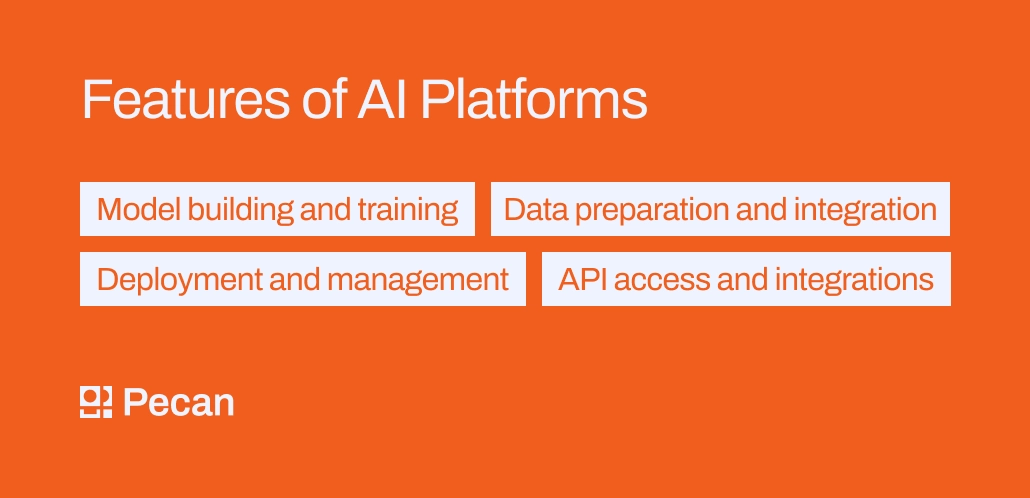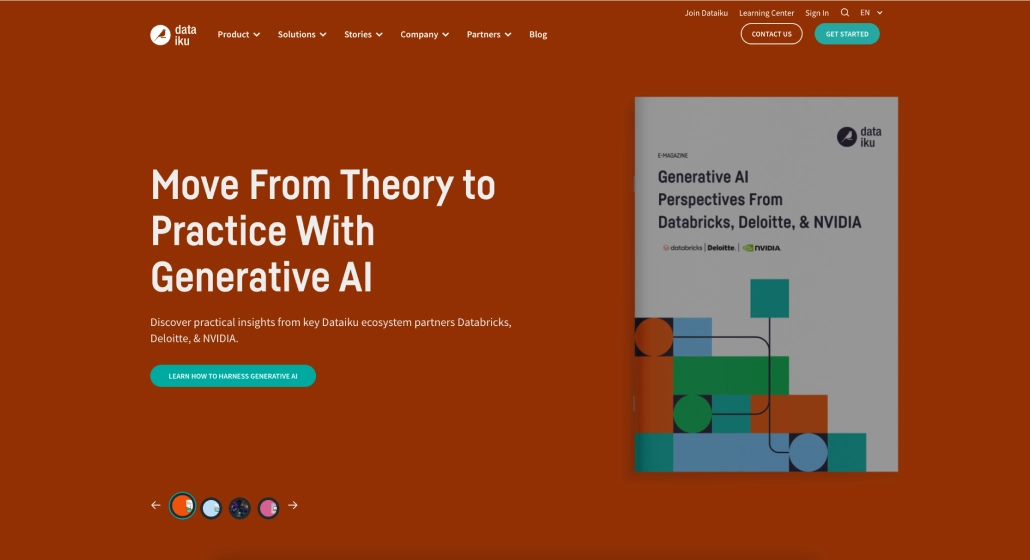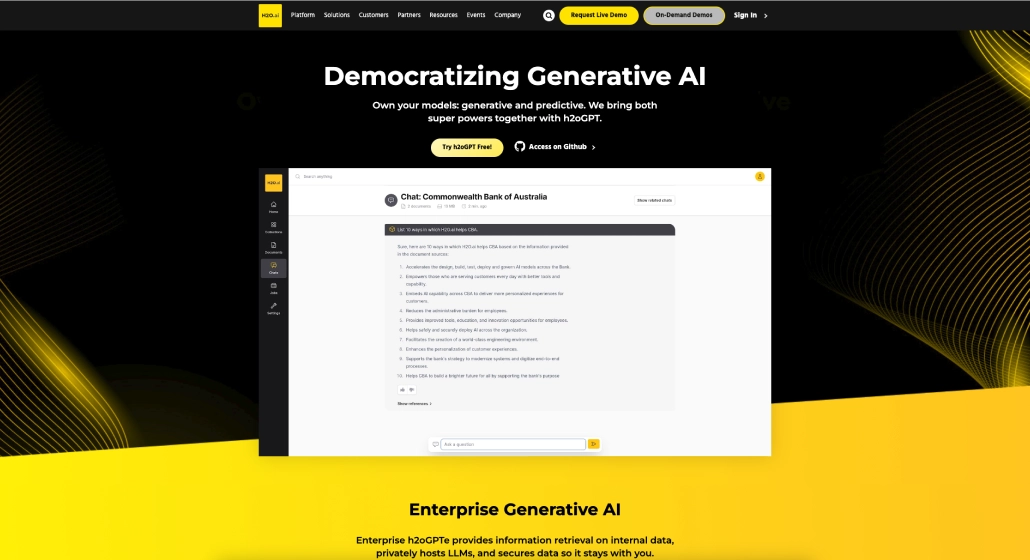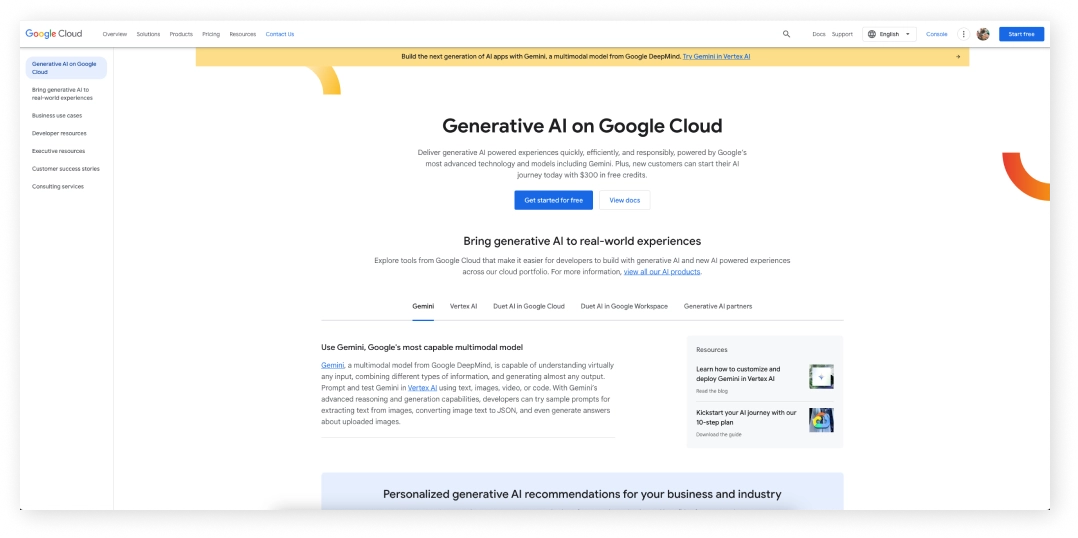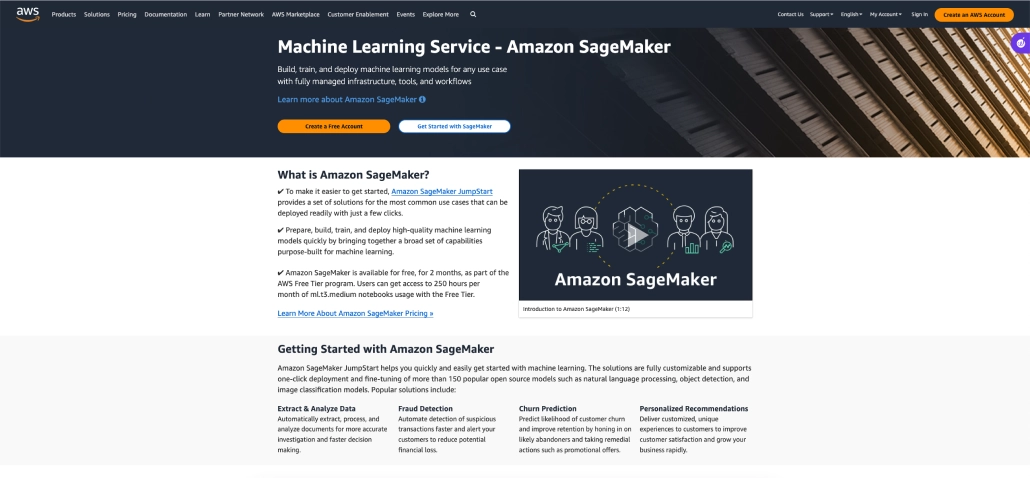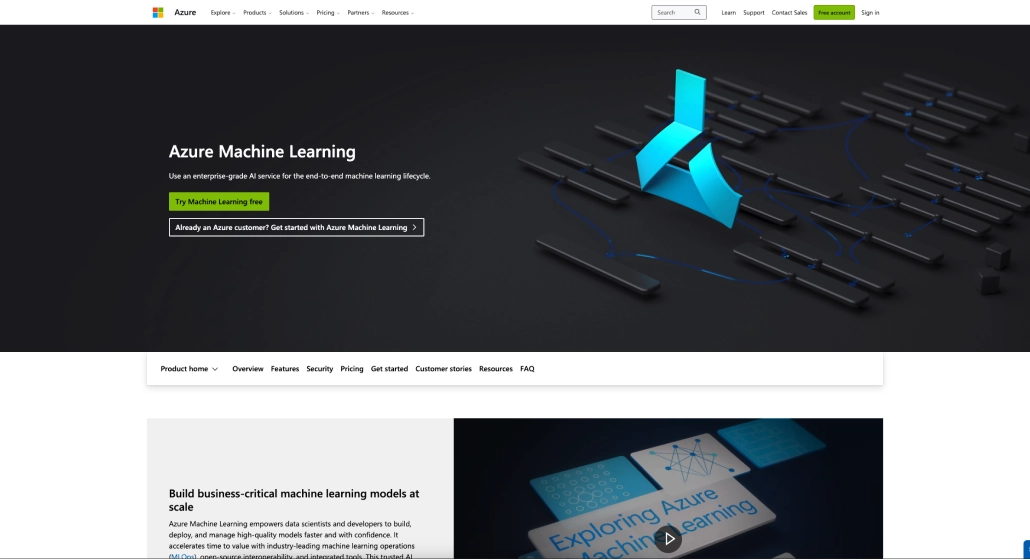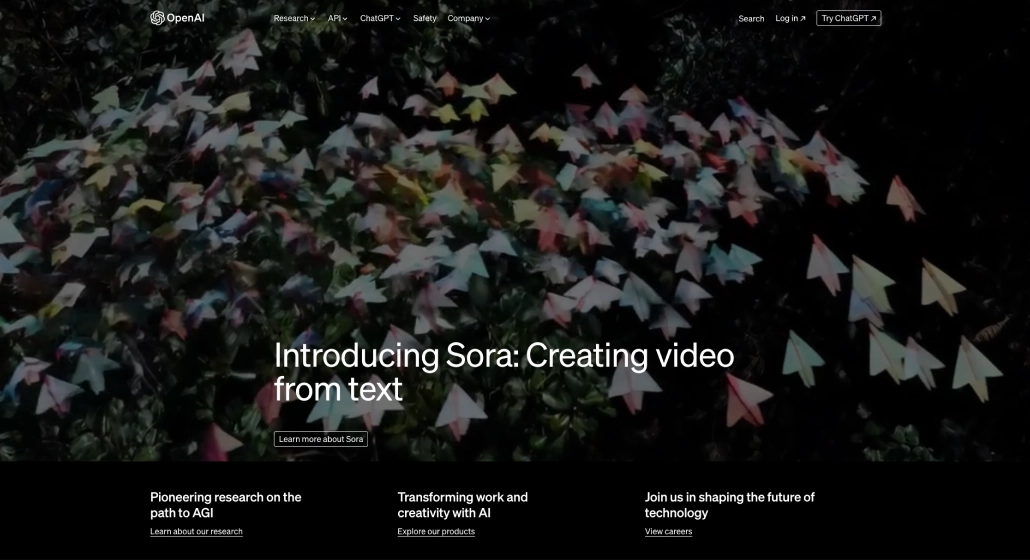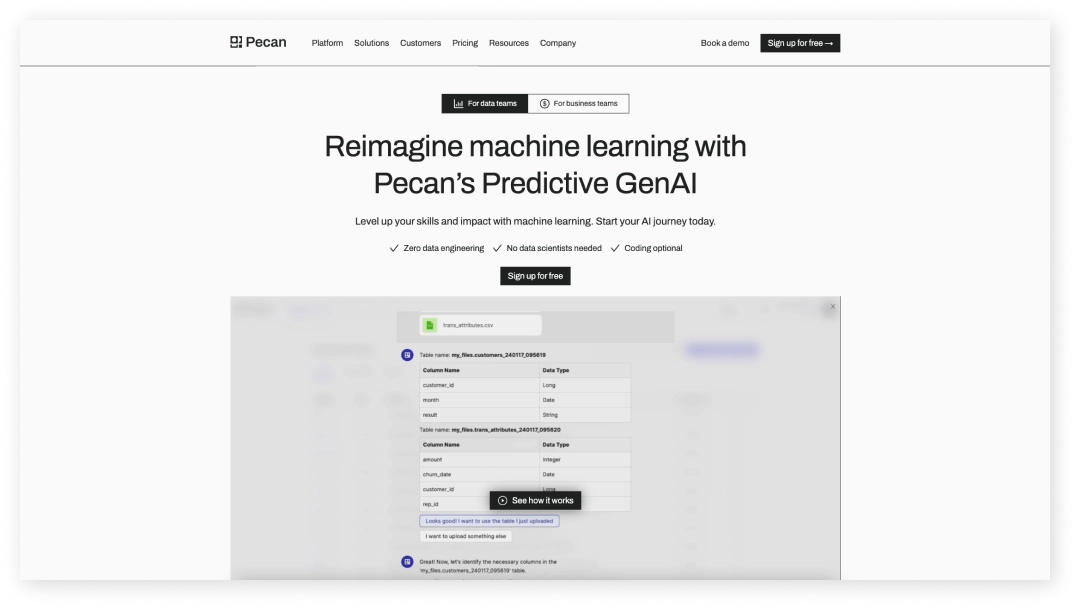In a nutshell:
- AI platforms have become more accessible and user-friendly, no data science degree required.
- AI platforms offer tools for building, training, deploying, and managing AI applications.
- Different AI platforms cater to various needs, from technical to non-technical users.
- Consider factors like skill level, budget, desired outcomes, and industry when choosing the right AI platform.
- Experimentation is key to finding the perfect AI platform for your business needs.
If you’ve ever been to a tech conference (think hype and company swag), you’ve probably listened to a keynote discussion about the “disruptive potential” of the best AI platforms. You may have even simultaneously wondered, “How does this actually help my business?” and “Shoot, do I need a Ph.D. in data science to understand how to use this?”
A few years ago, that may have been true. But today, understanding these platforms doesn’t require a data science degree—or even internal data science resources. Thanks to low-code, cloud-based platforms, artificial intelligence (AI) solutions have become increasingly easy to use and operate—you don’t need coding knowledge or expensive custom solutions.
-
- Photo by Jakub Żerdzicki on Unsplash
You can imagine AI platforms as supercharged assistants (or co-pilots, if you will), crunching data, identifying trends, and revealing insights that would otherwise take hours to find. Software companies like Pecan offer ready-built AI solutions: choose the right one, integrate it with your data and goals, and fine-tune it as needed.
Starting to sound a bit more doable, isn’t it? The key is to demystify the complexity and understand the practical applications of the different AI platforms in the market.
In this guide, we’ll peel back the layers of AI platforms, helping you choose the right one for your business needs and goals.
What Is an AI Platform?
Before diving into choosing the perfect AI platform, let’s take a step back. What exactly is an AI platform, and how can it benefit your business?
In essence, an AI platform is software that provides tools and resources for building, training, deploying, and managing AI applications. It’s like a one-stop shop for developing AI solutions, catering to everyone from seasoned data scientists to business professionals with limited coding experience.
-
- Photo by Jakub Żerdzicki on Unsplash
You might be asking, “Who needs an AI platform?”
The answer is anyone seeking to quickly unlock the power of data for smarter business decisions.
Here’s where AI platforms truly shine:
- Democratizing AI and data insights: Gone are the days when AI was reserved for enterprise tech giants. Today’s platforms offer user-friendly interfaces and prebuilt models, helping every company use their data, from enterprise companies to fledgling start-ups.
- Streamlining development: No more building custom models or AI solutions from scratch. Today’s AI platforms offer prebuilt tools, workflows, and resources, allowing you to rapidly prototype and deploy AI models and solutions.
- Scaling with ease: As your needs evolve, your AI platform can adapt. Many platforms offer scalable solutions that can grow alongside your business.
-
- AI platforms should offer some key features to maximize their benefit to your organization.
Now, let’s get into the specifics. AI platforms come in all shapes and sizes, each offering a unique blend of features and functionalities:
- Model building and training: Some AI platforms provide tools and prebuilt models for building different types of AI models, like predictive analytics to predict customer churn through machine learning, or generative AI to help you build models with natural language.
- Data preparation and integration: Other AI platforms specialize in helping you quickly clean, prepare, and integrate your data for seamless analysis and model construction.
- Deployment and management: It is crucial to deploy your AI model to production and manage its performance, security, and scalability. Some platforms offer dedicated tools for your MLOps needs.
- API access and integrations: Many platforms offer APIs for programmatic access and integration with other enterprise tools and platforms in your tech stack.
The key lies in choosing the platform that aligns with your specific needs and goals.
Generative vs. Predictive AI
There are two common types of AI: one predicts likely outcomes; the other generates media, content, code, and more and can even answer your questions via natural language.
Predictive AI, your data-driven fortune teller, analyzes historical data to forecast future outcomes. Think “customers who buy socks are likely to buy shoes,” or “marketing campaign X might generate Y% more leads.”
Generative AI, your creative AI assistant, conjures original text, code, or even images based on your input. You can write a product description and have AI craft variations for different audiences, or feed it code snippets and let it complete the function.
Both are impressive, powerful tools. Some platforms, like Pecan, even combine them, allowing you to bring the power of generative AI into your process of building a machine learning model.
With our new Predictive GenAI capabilities, Pecan merges the creativity and code-generating power of generative AI with advanced, automated predictive AI. This leap forward empowers anyone to put predictive analytics into practice with simple language prompts.
We’re just one player in the AI platform game, but we’ve compiled a list of the best AI platforms — predictive and generative AI — to help you make a quick and impactful difference in your organization.
Here are the top AI platforms:
7 Popular AI Platforms
Now, let’s meet some of the leading players in the AI platform game. Remember, there’s no one-size-fits-all solution, so understanding each platform’s strengths and limitations is crucial.
-
- Source: Dataiku
1. Dataiku
What it does: Dataiku is a comprehensive AI analytics platform designed to empower users to build, deploy, and manage AI solutions. It caters to both technical and non-technical users.
Strengths: Drag-and-drop interface, flexibility over the entire analytics lifecycle, ideal for customization and tinkering.
Weaknesses: Steeper learning curve compared to low-code options.
Ideal for: Teams with data science expertise who need granular control over their AI models.
-
- Source: H2O.ai
2. H2O.ai
What it does: H2O.ai is an open-source AI platform offering powerful tools and algorithms for building and deploying AI models.
Strengths: Open-source, scalable, packed with tools and algorithms for advanced users.
Weaknesses: Requires coding knowledge; a limited number of prebuilt models compared to competitors.
Ideal for: Experienced programmers who enjoy building and experimenting with AI models from scratch.
-
- Source: Google Cloud
3. Google Cloud AI Platform
What it does: Google Cloud AI Platform is a managed cloud platform that provides tools and services for building, deploying, and managing AI models at scale.
Strengths: Comprehensive suite for building and deploying AI solutions, prebuilt models, and seamless integration with other Google Cloud services.
Weaknesses: Learning curve; potential cost considerations, especially with high-volume usage.
Ideal for: Enterprises with existing Google Cloud infrastructure who need a comprehensive AI solution.
-
- Source: Amazon
4. Amazon SageMaker
What it does: Amazon SageMaker streamlines the process of building, training, and deploying AI models in the cloud. Designed for data scientists and developers, this service empowers users to work efficiently and confidently across various development environments.
Strengths: Cloud-based tools, integration with AWS services, comprehensive solution for building and deploying AI models.
Weaknesses: Learning curve and potential costs associated with cloud-based infrastructure.
Ideal for: Organizations using AWS who need a scalable AI solution with access to cloud resources.
-
- Source: Microsoft
5. Microsoft Azure Machine Learning
What it does: Azure Machine Learning functions as a cloud platform, offering an end-to-end solution for accelerating AI and machine learning projects.
Strengths: Tools and integration with Azure services, similar features and functionalities to Google and Amazon platforms.
Weaknesses: Complexity, potentially high costs.
Ideal for: Organizations using Azure who need a familiar platform for building and deploying AI models.
-
- Source: OpenAI
6. OpenAI
What it does: OpenAI develops and provides access to advanced AI tools, primarily focusing on large language models (LLMs) for image and text generation, code completion, and more.
Strengths: Access to powerful language models like GPT-4 for text generation, translation, and code completion.
Weaknesses: Limited control and customization, high costs for large-scale usage, ethical considerations surrounding potential bias and misuse.
Ideal for: Specific use cases requiring advanced text generation or code completion, with careful consideration of ethical implications and costs.
-
- Source: Pecan AI
7. Pecan
What it does: Pecan AI is an AI-powered predictive analytics platform that empowers users with little coding experience to make data-driven decisions. Its low-code interface uses guided prompts to help users easily navigate the platform and build predictive models.
Strengths: Low-code interface, guided prompts for quick AI insights, focus on marketing and sales use cases, Predictive GenAI features allow users to identify problems and generate models through natural language.
Weaknesses: Predictive Notebook may require some SQL knowledge to adjust the model training dataset; highly complex models could require more support from the Pecan team.
Ideal for: Business and data teams with limited technical expertise who need user-friendly AI tools for customer analysis, trend prediction, and campaign optimization.
How Do You Choose the Right AI Platform?
Now that you have a clear picture of the top AI platforms, it’s time to start your journey of finding the perfect match. Remember, the ideal platform depends on your specific needs and goals.
Consider the following factors when making your decision:
Skill Level
Are you a tech-savvy data scientist or a business professional with limited coding experience? Choose a platform that aligns with your comfort level.
Budget
AI platforms can range in price from free trials to enterprise-level subscriptions. Consider your budget constraints and choose a platform with a pricing model that fits your needs.
Desired Outcomes
What do you hope to achieve with AI? Do you need to predict customer churn, personalize marketing campaigns, or automate tasks? Choose a platform with features and functionalities to help you reach your goals.
Industry
Some platforms cater to specific industries, offering specialized features and prebuilt models. Consider if industry-specific solutions are valuable for you.
Start Experimenting
Researching, comparing features, and attending webinars are valuable resources. But the ultimate key to finding your perfect AI platform lies in experimentation. This experiential approach allows you to see how different AI platforms function in your specific workflow and assess their suitability for your needs.
Take advantage of free trials and demos to experience the platforms firsthand. Pecan offers a free trial so you can try our platform risk-free.
Remember, this landscape constantly evolves, and the best AI platforms are diligently innovating. By grasping the fundamentals, exploring your options, and making an informed choice, you unlock the power of AI to transform your business and gain a decisive edge in your industry.
Ready to embark on your AI journey? Book a demo today.



